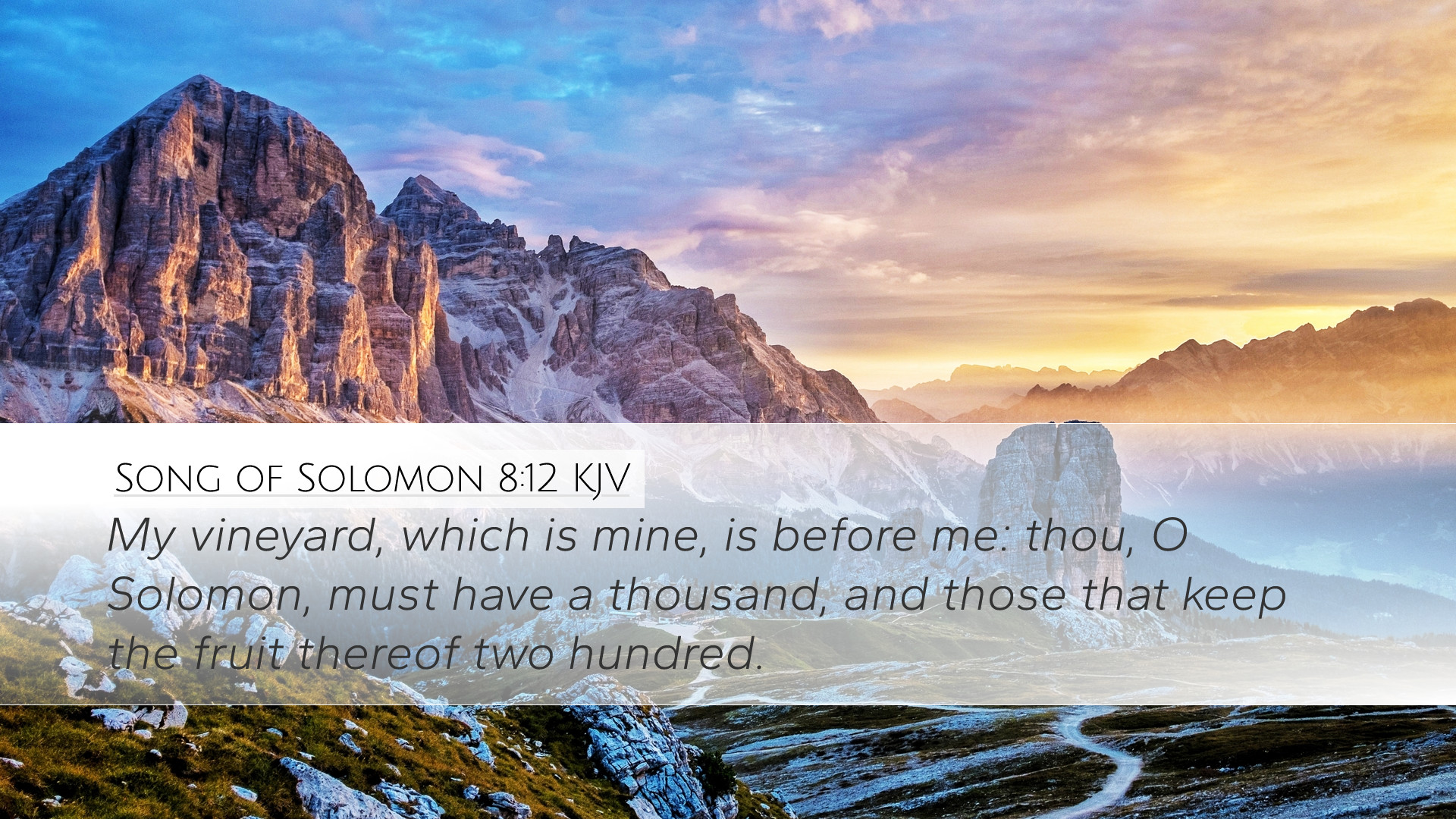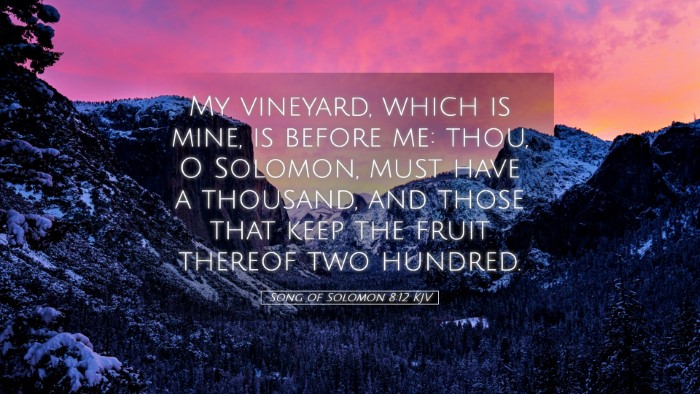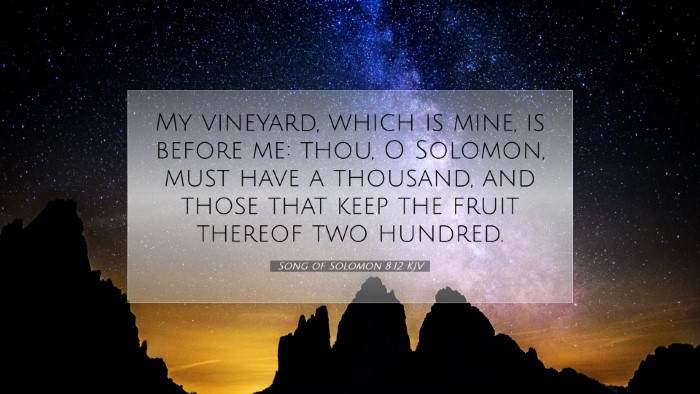Old Testament
Genesis Exodus Leviticus Numbers Deuteronomy Joshua Judges Ruth 1 Samuel 2 Samuel 1 Kings 2 Kings 1 Chronicles 2 Chronicles Ezra Nehemiah Esther Job Psalms Proverbs Ecclesiastes Song of Solomon Isaiah Jeremiah Lamentations Ezekiel Daniel Hosea Joel Amos Obadiah Jonah Micah Nahum Habakkuk Zephaniah Haggai Zechariah MalachiSong of Solomon 8:12
Song of Solomon 8:12 KJV
My vineyard, which is mine, is before me: thou, O Solomon, must have a thousand, and those that keep the fruit thereof two hundred.
Song of Solomon 8:12 Bible Commentary
Commentary on Song of Solomon 8:12
Verse Text: "My vineyard, which is mine, is before me: thou, O Solomon, must have a thousand, and those that keep the fruit thereof two hundred."
Introduction
The Song of Solomon, attributed to Solomon, is a poetic and allegorical exploration of love and desire. In this complex and layered text, Song of Solomon 8:12 reveals a profound expression of individuality within relationship dynamics. Through the lens of public domain commentaries, we will explore the multifaceted interpretations of this verse and its implications for relationships, identity, and stewardship.
Understanding the Context
In the previous verses, particularly those surrounding this verse, we find a culmination of passionate dialogue between the lover and the beloved. This interlude signifies an established relationship, with themes of love, commitment, and responsibility emerging prominently. The speaker in verse 12 presents a metaphor of possession and stewardship, highlighting intimacy and the seriousness of love.
Interpretation of Key Phrases
Exegesis of the text reveals rich meanings in several key phrases:
- "My vineyard, which is mine, is before me."
This suggests a sense of personal ownership and accountability in the context of love. The vineyard represents one's own emotional and relational investments, cultivated through care and affection.
- "Thou, O Solomon, must have a thousand."
Here, the addressee is King Solomon, often symbolizing wealth, power, and wisdom. The phrase implies that while Solomon may possess many lovers or riches, the intimate relationship highlighted in this verse symbolizes something more profound and irreplaceable.
- "And those that keep the fruit thereof two hundred."
This could indicate the guardians of the vineyard, representing those who ensure that love flourishes and remains protected. The numbers reflect both the abundance in love and the possible responsibilities tied to nurturing it.
Theological Significance
Various commentators provide insight into the theological implications of this verse:
- Matthew Henry:
Henry emphasizes the idea of stewardship in relationships. He suggests that just as a vineyard requires diligent care, so too does love require attention and commitment from both partners. This underscores God’s desire for relationships marked by fidelity, cultivation, and cooperation.
- Albert Barnes:
Barnes interprets the mention of Solomon and the reference to numerous vineyards as a reflective beginning to the discussion of true value in love. He points out that worldly riches and pursuits cannot replace the worth of a faithful relationship, thus reinforcing the idea of love being more precious than material wealth.
- Adam Clarke:
Clarke observes the metaphorical nature of the vineyard. He suggests that the vineyard symbolizes the beloved's heart and affections. The care indicated in the passage is an allegory for the nurturing of emotional and spiritual bonds, implying that true love requires investment and protection.
Applications for Modern Readers
This verse has tangible applications for individuals today, especially pastors, students, theologians, and Bible scholars:
- Understanding Ownership:
In modern contexts, relationships often demand a sense of ownership and responsibility. Reflecting on this verse prompts individuals to contemplate their roles within their relationships—what they contribute and how they can cultivate deeper connections.
- Nurturing Relationships:
Like a vineyard that requires ongoing care, our relationships thrive through deliberate actions. This verse invites reflection on how we can actively nurture our relationships, fostering an environment where love and trust can grow.
- Valuing the Unique:
In a world that often places value on quantity over quality, this verse calls for the recognition of unique partnerships that stand apart from superficial connections. It serves as a reminder that true intimacy requires investment beyond mere appearances or affections.
Conclusion
Song of Solomon 8:12 serves as a poignant reminder of the intricacies of love, ownership, and responsibility within relationships. Throughout the commentaries, we observe that the vineyard symbolizes both personal investment and the care needed to maintain a fruitful relationship. As we engage with the text, may we seek to embody the principles of nurturing and stewardship in our own lives and connections, honoring the divine calling to love profoundly and faithfully.


